CONTENTS.
Page
The Man with the Pan-Pipes
7
Pig-Betty
30
The Dormouse's Mistake.
51
The Christmas Guest.
59
Olive's Tea-party.
67
A Live Dummy.
76
A Queer Hiding-Place
83
Blue Frocks and Pink Frocks
90
[7]
The Man with the Pan-Pipes
CHAPTER I.
When I was a little girl, which is now a good many years ago, there came to spend some time with us a cousin who had been brought up in Germany. She was almost grown-up—to me, a child of six or seven, she seemed quite grown-up; in reality, she was, I suppose, about fifteen or sixteen. She was a bright, kind, good-natured girl, very anxious to please and amuse her little English cousins, especially me, as I was the only girl. But she had not had much to do with small children; above all, delicate children, and she was so strong and hearty herself that she did not understand anything about nervous fears and fancies. I think I was rather delicate, at least, I was very fanciful; and as I was quiet and gave very little trouble, nobody noticed how constantly I was reading, generally in a corner by myself. I now see that I read far too many stories, for even of good and harmless things it is possible to have too[8] much. In those days, fortunately for me, there were not nearly so many books for children, so, as I read very fast, I was often obliged to read the same stories over and over again. This was much better for me than always getting new tales and galloping through them, as I see many children do now-a-days, but still I think I lived too much in story-book world, and it was well for me when other things forced me to become more, what is called, "practical."
My cousin Meta was full of life and activity, and after awhile she grew tired of always finding me buried in my books.
"It isn't good for you, Addie," she said. "Such a dot as you are, to be always poking about in a corner reading."
She was quite right, and when mamma's attention was drawn to it she agreed with Meta, and I was given some pretty fancy-work to do and some new dolls to dress, and, above all, I was made to play about in the garden a good deal more. It was not much of a garden, for our home was then in a town, still it was better than being indoors. And very often when kind Meta saw me looking rather forlorn, for I got quickly tired with outdoor games, she would come and sit with me in the arbour, or walk about—up and down a long gravel path there was—telling me stories.
That was her great charm for me. She was really splendid at telling stories. And as hitherto she had only done me good, and mamma knew what a sensible girl she was, Meta was left free to tell me what stories she chose. They were all nice stories, most of them very[9] interesting. But some were rather too exciting for such a tiny mite as I was. Meta had read and heard quantities of German fairy-tales and legends, many of which I think had not then been printed in books—certainly not in English books. For since I have been grown-up I have come across several stories of the kind which seemed new to most readers, though I remember my cousin telling them to me long, long ago.

There were wonderful tales of gnomes and kobolds, of the strange adventures of the charcoal-burners in lonely forests, of water-sprites and dwarfs. But none of all these made quite as great an impression on me as one which Meta called "The Man with the Pan-pipes," a story which, much to my surprise, I found years after in a well-known poem called "The Pied Piper of Hamelin." It was the very same story as to the facts, with just a few differences; for instance, the man in the poem is not described as playing on pan-pipes, but on some other kind of pipe. But though it is really the same, it seems quite, quite[10] different from the story as I heard it long ago. In the poem there is a wonderful brightness and liveliness, and now and then even fun, which were all absent in Meta's tale. As she told it, it was strangely dark and mysterious. I shall never forget how I used to shiver when she came to the second visit of the piper, and described how the children slowly and unwillingly followed him—how he used to turn round now and then with a glance in his grim face which made the squeal of the pipes still more unearthly. There was no beauty in his music, no dancing steps were the children's whom he dragged along by his power; "they just had to go," Meta would say. And when she came to the mysterious ending, my questions were always the same.

"Are they still there—shut up in the cave?" I would ask.
Meta supposed so.
"Will they never come out—never, never?" I said.
She shook her head.
[11]

"And if they ever did," I said, "would they be grown-up people, or quite old like—like that man you were telling me about. Rip—Rip—"
"Rip van Winkle," she said.
"Yes, like Rip van Winkle, or would they have stayed children like the boy the fairies took inside the hill to be their servant?"
Meta considered.
"I almost think," she said, seriously, "they would have stayed children. But, of course, it's only a story, Addie. I don't suppose it's true. You take things up so. Don't go on puzzling about it."
I would leave off speaking about it for the time; I was so dreadfully[12] afraid of her saying she would not tell it me again. And even though I knew it quite well, and could correct Meta if ever she made any part of it the least different, I was never tired of hearing the story. I would ask for it over and over again, and I used to have exactly the same feelings each time she told it, and always at the part where the children began to come out of their houses, some leaving their dinners, some tiny ones waking up out of their sleep, some only half-dressed, but all with the same strange look on their faces, I used to catch hold of Meta's hand and say to her, "Hold me fast, I'm so afraid of fancying I hear him," and then she would burst out laughing at me, and I would laugh at myself. For she was far too kind a girl to think of frightening me, and, indeed, except for a curious "coincidence"—to use a very long word which means something of the same kind as another thing happening at or about the same time—I do not think the story would have really taken hold of my fancy as it did.
One of my questions Meta was not able for some time to answer to my satisfaction.

[13]
"What are Pan-pipes?" I asked. The word "pipe" was so mixed up in my mind with white clay pipes, out of which we used to blow soap bubbles, that I could not understand it having to do with any kind of music.
"Oh," said Meta, "they're made of reeds, you know, all in a row like this," and she held up her fingers to her lips, "and you play them by whistling along them, do you see? It sounds something like when you fasten tissue-paper on a comb and blow along it. And they're called 'Pan'-pipes because—oh, I forgot, of course you haven't learnt mythology yet—'Pan' was one of the old pagan gods, a sort of fairy or wood sprite, you know, Addie, and the pictures and figures of him always show him playing on these reed pipes!"
I said "Yes," but I didn't really understand her description. It left a queer jumble in my head, and added to the strange, dreamy medley already there. But, though it was not till years afterwards that I learnt about "Pan," before Meta left us I was able to see for myself a set of his "pipes."
[14]
CHAPTER II.

IT was just before my merry cousin left us, to return to her own
home across the sea.
One day several of us were out walking together. Meta was in front with mamma and one of my elder brothers, I was behind with Tony and Michael, the two nearer my own age. Suddenly Meta glanced round.
"Look, Addie," she called back, "there's a set of Pan-pipes; you wanted to know what they were like. They're a very doleful set, certainly; did you ever see such a miserable object? He must be silly in his head, poor thing, don't you think, aunty? May I give him a penny—or Jack will."
For even Meta did not seem inclined to go too near to the poor man, whom she was indeed right in calling "a miserable object."
[15]
Jack ran forward with the penny, and we all stopped for a moment, so I had a full view of the Pan-pipes. They were fastened somehow on to the man's chest, so that their top just came near his lips, and as he moved his head slowly backwards and forwards along them, they gave out the most strange kind of music, if music it could be called, which you ever heard. It was a sort of faint squeak with just now and then a kind of tone in it, like very doleful muffled whistling. Perhaps the sight of the piper himself added to the very "creepy" feeling it gave one. He was not only a piper, he was, or rather had been, an organ-grinder too, for he carried in front of him, fastened by straps round his neck in the usual way, the remains of a barrel organ. It had long ago been smashed to pieces, and really was now nothing but an old broken-in wooden box, with some fragments of metal clinging to it, and the tatters of a ragged cover. But the handle was still there; perhaps it had been stuck in again on purpose; and all the time, as an accompaniment to the forlorn quaver of the reed pipes, you heard the hollow rattle of the loose boards of what had been the barrel-organ. He kept moving the handle round and round, without ever stopping, except for a moment, when Jack half threw, half reached him the penny, which brought a sort of grin on to his face, as he clutched at the dirty old tuft of shag on the top of his head, which he doubtless considered his cap.
"Poor creature," said mamma, as we turned away. "I suppose he thinks he's playing lovely music."
"I've seen him before," said Jack. "Not long after we came here."[16] (Perhaps I should explain that my father was an officer, and we had to go about wherever his regiment was sent.) "But I've not seen him lately. There's some story about him, but I know some of the boys at school declare he's not mad a bit, that he finds it pays well to sham he is."
"Any way he doesn't need to be afraid of his organ wearing out," said Tony, gravely, at which the others couldn't help laughing.
"I shouldn't think it likely he is only pretending," said mamma. "He looks almost too miserable."
"And sometimes there's quite a crowd of children after him," Jack went on; "they seem to think him quite as good to run after as a proper barrel-organ man."
"I hope they don't hoot and jeer at him," said mamma.
[17]
"His Pan-pipes are nearly as bad as his organ," said Meta. "Still, Addie, you know now what they're like, though you can't fancy how pretty they sound sometimes."
It did not need her words to remind me of the story. My head was full of it, and I think what Jack said about the crowds of children that sometimes ran after the strange musician, added very much to the feelings and fancies already in my mind. And unfortunately Meta left us the very next morning, so there was no one for me to talk to about it, for my brothers were all day at school and did not know anything about our story-tellings. I do remember saying to Meta that evening, that I hoped we should never meet that ugly man again, and Meta could not think what I meant, till I said something about Pan-pipes. Then she seemed to remember.
"Oh, he didn't play them at all nicely," she said. "One of the boys at home had a set, and he really made them sound lovely. When you come to Germany, Addie," for that was a favourite castle in the air of ours—a castle that never was built—that I should one day pay a long visit to my cousins in their quaint old house, "Fritz will play to you, and you will then understand the story better."
I daresay I should have told her the reason why I so hoped I should never meet the poor man again, if I had had time. But even to her I was rather shy of talking about my own feelings, and it was also not easy to explain them, when they were so mixed up and confused.
It was only a few days after Meta left, that we met the man with the[18] Pan-pipes again. This time I was out walking with our nurse and the baby, as we still called him, though he was three years old. I don't think nurse noticed the man, or perhaps she had seen him before, but I heard the queer squeal of his pipes and the rattle of his broken box some way off, and when I saw him coming in the distance I asked her if we might turn down a side street and go round another way.
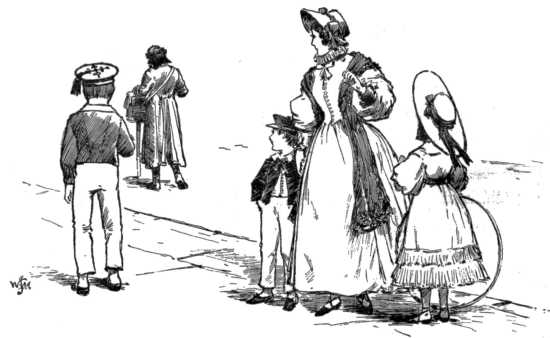
She said she did not mind, but though she was kind, she was not very noticing, and did not ask my reason, so for that day it was got over without my needing to explain. But for some time after that, we seemed to be always meeting the poor "silly" organ-man, and every time I saw him, I grew more and more frightened, till at last the fear of seeing[19] him came quite to spoil the pleasure of my walks, even when I was out with mamma herself. Now I dare say all sensible children who read this will say, "Why didn't Addie tell her nurse, or, any way, her mother, all about it?" and if they do say so, they are quite right. Indeed, it is partly to show this very thing—how much better it is to tell some kind wiser person all about any childish fear or fancy, than to go on bearing it out of dread of being laughed at or called babyish—that I am relating this simple little story. I really cannot quite explain why I did not tell about it to mamma—I think it was partly that being the only girl, I had a particularly great fear of being thought cowardly—for she was always very kind; and I think, too, it was partly that from having read so many story-books to myself, I had got into the habit of being too much inside[20] my own thoughts and fancies. I think story-books would often do much more good, and give really much more lasting pleasure if children were more in the habit of reading aloud to each other. And if this calls for some unselfishness, why, what then? is it not all the better?
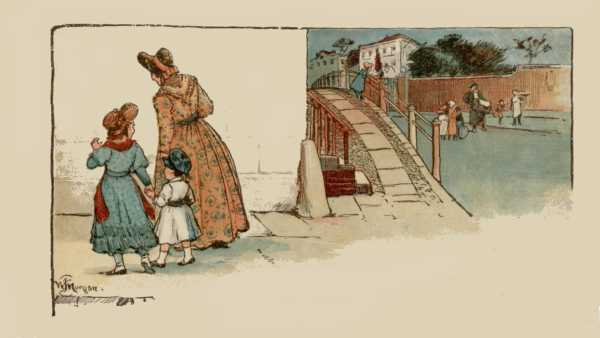
But to return to my own story. There came a day when my dread of the man with the pipes got quite beyond my control—happily so for me.
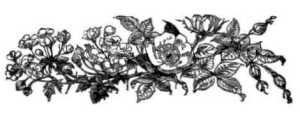
[21]
CHAPTER III.
Hitherto, every time I had seen the man, it had been either in some large public street where a crowd would not have been allowed to collect, or in one of the quieter roads of private houses, where we generally walked, and where poor children seldom were to be seen.
But one day mamma sent Baby and me with nurse to carry some little comfort to one of the soldier's wives, who was so ill that she had been moved to the house of relations of hers in the town. They were very respectable people, but they lived in quite a tiny house in a poor street. Baby and I had never been there before, and we were much interested in watching several small people, about our own size, playing about. They were clean, tidy-looking children, so nurse, after throwing a glance at them, told us we might watch them from the door of the house while she went in to see the sick woman.
We had not stood there more than a minute or two when a strange, well-known sound caught my ears, squeak, squeal, rattle, rattle, rattle. Oh, dear! I felt myself beginning to tremble; I am sure I grew pale. The children we were watching started up, and ran some paces down the[22] street to a corner, when in another moment appeared what I already knew was coming—the man with the Pan-pipes! But never had the sight of him so terrified me. For he was surrounded by a crowd of children, a regular troop of them following him through the poor part of the town where we were. If I had kept my wits, and looked on quietly, I would have soon seen that the children were not the least afraid, they were chattering and laughing; some, I fear, mocking and[23] hooting at the poor imbecile. But just at that moment the last touch was added to my terror by my little brother pulling his hand out of mine.
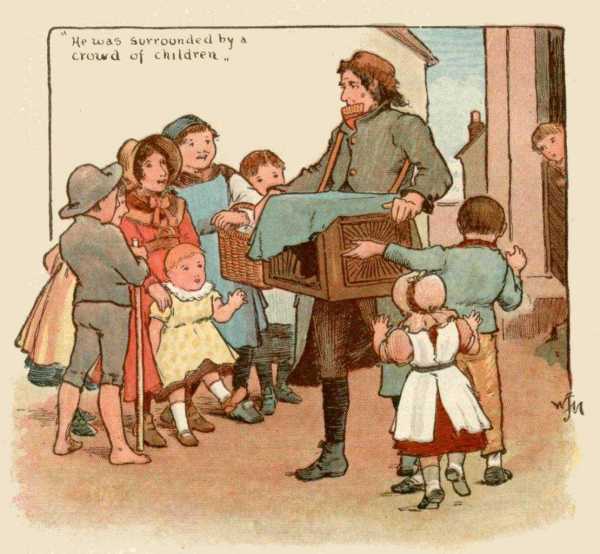
"Baby wants to see too," he said, and off he trotted down the street.
My senses seemed quite to go.
"He's piping them away," I screamed, and then I am ashamed to say I turned and fled, leaving Baby to his fate. Why I did not run into the house and call nurse, I do not know; if I thought about it at all, I suppose I had a hazy feeling that it would be no good, that even nurse could not save us. And I saw that the crowd was coming my way, in another minute the squeaking piping would be close beside me in the street. I thought of nothing except flight, and terrified that I too should be bewitched by the sound, I thrust my fingers into my ears, and dashed down the street in the opposite direction from the approaching crowd. That was my only thought. I ran and ran. I wonder the people I passed did not try to stop me, for I am sure I must have looked quite as crazy as my imaginary wizard! But at last my breath got so short that I had to pull up, and to my great relief I found I was quite out of hearing of the faint whistle of the terrible pipes.
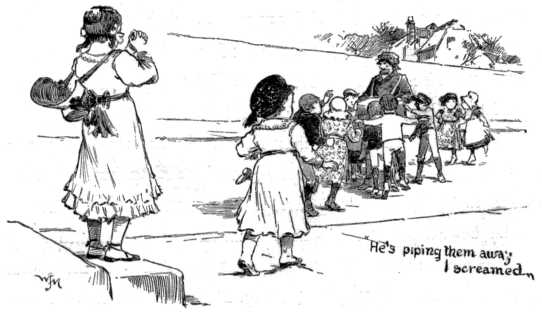
Still I was not completely reassured. I had not come very far after all. So I set off again, though not quite at such a rate. I hurried down one street and up another, with the one idea of getting further[24] and further away. But by degrees my wits began to recover themselves.
"I wish I could find our home," I thought. "I can't go on running for always. Perhaps if I told mamma all about it, she'd find some way of keeping me and Baby safe."
But with the thought of Baby came back my terrors. Was it too late to save him? Certainly there were no rocks or caves to be seen such as Meta had described in her story. But she had said outside the town—perhaps the piper was leading all the children, poor darling Baby among them, away into the country, to shut them up for ever as had been done in Hamelin town. And with the dreadful thought, all my terrors revived, and off I set again, but this time with the[25] more worthy intention of saving Baby. I must go home and tell mamma so that she would send after him. I fancied I was in a street not far from where we lived, and I hurried on. But, alas! when I got to the end it was all quite strange. I found myself among small houses again, and nearly dead with fatigue and exhaustion, I stopped in front of one where an old woman was sweeping the steps of her door.
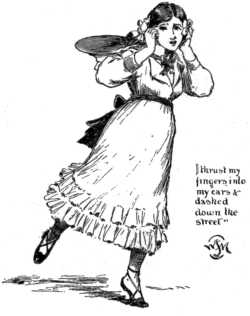
"Oh, please," I gasped, "please tell me where Clarence Terrace is."
The old woman stopped sweeping, and looked at me. She was a very clean old woman, though so small that she was almost a dwarf, and with a slight hump on her shoulders. At another time I might have been so silly as to be frightened of her, so full was my head of fanciful ideas. But now I was too completely in despair to think of it. Besides her face was kind and her voice pleasant.
"Clarence Terrace," she squeaked. "'Tis a good bit from here. Have you lost your way, Missy?"
"I don't know," I said, "I——" but then a giddy feeling came over me, and I almost fell. The old woman caught me, and the next thing I knew was that she had carried me into her neat little kitchen, and was holding a glass of water to my lips, while she spoke very kindly. Her voice somehow brought things to a point, and I burst into tears. She soothed me, and petted me, and at last in answer to her repeated, "What's ado, then, lovey?" I was able to explain to her some part of[26] my troubles. Not all of course, for even upset as I was, I had sense to know she would have thought me not "right in my head," if I had told her my cousin's strange fantastic story of the piper in the old German town.
"Frightened of old Davey," she said, when I stopped. "Dear dear, there's no call to be afeared of the poor old silly. Not but what I've said myself he was scarce fit to be about the streets for the look of him, though he'd not hurt a fly, wouldn't silly Davey."
"Then do you know him?" I asked, with a feeling of great relief.[27] All the queer nightmare fears seemed to melt away, when I heard the poor crazy piper spoken of in a matter-of-fact way.
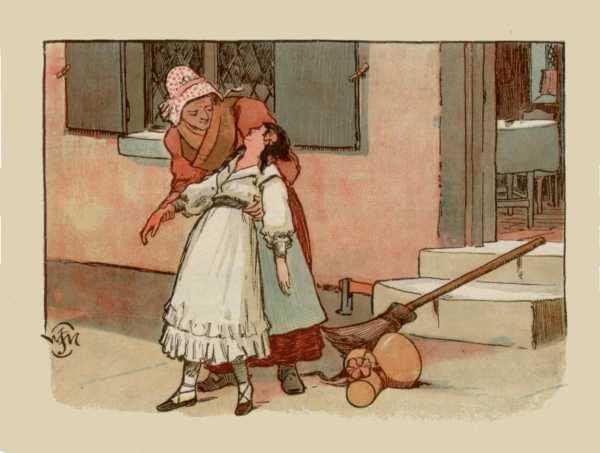
"Know him," repeated my new friend, "I should think we did. Bless you he comes every Saturday to us for his dinner, as reg'lar as the clock strikes, and has done for many a day. Twelve year, or so, it must be, since he was runned over by a bus, and his poor head smashed in, and his organ busted, and his pipes broke to bits. He was took to the 'orspital and patched up, but bein' a furriner was against him, no doubt," and the old woman shook her head sagely. "He couldn't talk proper before, and since, he can say nothink as[28] any one can make head or tail of. But as long as he's free to go about with his rattlin' old box as was onst a' orgin, he's quite happy. They give 'im new pipes at the 'orspital, but he can't play them right. And a bit ago some well-intending ladies had 'im took off to a 'sylum, sayin' as he wasn't fit to be about. But he nearly died of the bein' shut up, he did. So now he's about again, he has a little room in a street near here, that is paid for, and he gets a many pennies, does Davey, and the neighbours sees to him, and he's quite content, and he does no harm, and all the town knows silly Davey."
"But don't naughty children mock at him and tease him sometimes?" I asked.
"Not so often as you'd think, and they're pretty sure to be put down if they do. All the perlice knows Davey. So now, my dear, you'll never be afeared of the poor thing no more, will you? And I'll step round with you to your 'ome, I will, and welcome."
So she did, and on the way, to my unspeakable delight, we came across nurse and Baby, nearly out of their wits with terror at having lost me. For Baby had only followed the piper a very short way, and did not find him interesting.
"Him were a old silly, and couldn't make nice music," said sensible Baby.
And though we often met poor crazy Davey after that, and many of my weekly pennies found their way to him as long as we stayed in the[29] place, I never again felt any terror of the harmless creature. Especially after I had told the whole story to mamma, who was wise enough to see that too many fairy stories, or "fancy" stories are not a good thing for little girls, though of course she was too kind and too just to blame Meta, who had only wished to entertain and amuse me.

[30]
Pig-Betty
By Mrs. Molesworth
PART I.
I AM going to tell you a story that mother told us. We think mother's stories far the most interesting and nicest of any we hear or read. And we are trying to write them all down, so that our children, if ever any of us have any, may know them too. We mean to call them "Grandmother's Stories." One reason why they are nice is, that nearly all of them are real, what is called "founded on fact." By the time our children come to hear them, mother says her stories will all have grown dreadfully old-fashioned, but we tell her that will make them all the nicer. They will have a scent of long-ago-ness about them, something like the[31] faint lavendery whiff that comes out of mother's old doll-box, where she keeps a few of the toys and dolls' clothes she has never had the heart to part with.
The little story, or "sketch"—mother says it isn't worth calling a "story"—I am going to write down now, is already a long-ago one. For it isn't really one of mother's own stories; it was told her by her mother, so if ever our book comes to exist, this one will have to have a chapter to itself and be called "Great-grandmother's Story," won't it? I remember quite well what made mother tell it us. It was when we were staying in the country one year, and Francie had been frightened, coming through the village, by meeting a poor idiot boy who ran after us and laughed at us in a queer silly way. I believe he meant to please us, but Francie's fright made her angry, and she wanted nurse to speak to him sharply and tell him to get away, but nurse wouldn't.
"One should always be gentle to those so afflicted," she said.
When we got home we told mother about it, and Francie asked her to speak to nurse, adding, "It's very disagreeable to see people like that about. I think they should always be shut up, don't you, mother?"
"Not always," mother replied. "Of course, when they are at all dangerous, likely to hurt themselves or any one else, it is necessary to shut them up. And if they can be taught anything, as some can be, it is the truest kindness to send them to an asylum, where it is wonderful what patience and skill can sometimes make of them.[32] But I know about that boy in the village. He is perfectly harmless, even gentle and affectionate. He has been at a school for such as he, and has learnt to knit—that is the only thing they could succeed in teaching him. It was no use leaving him there longer, and he pined for home most sadly. So as his relations are pretty well off, it was thought best to send him back, and he is now quite content. I wish I had told you about him. When you meet him again you must be sure to speak kindly—they say he never forgets if any one does so."
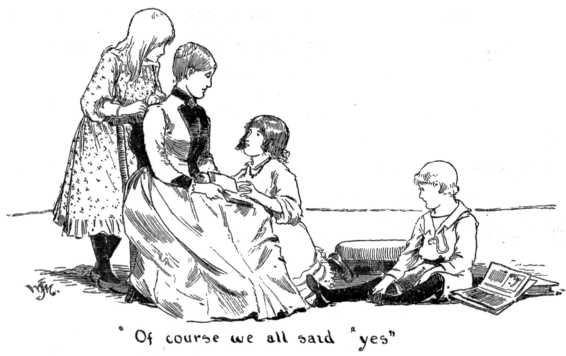
[33]
"Poor boy," said Ted and I; but Francie did not look quite convinced.
"I think he should be shut up," she repeated, in rather a low voice. Francie used to be a very obstinate little girl. "And I shan't speak to him kindly or any way."
Mother did not answer, though she heard. I know she did. But in a minute or two she said:
"Would you like to hear a story about an idiot, that your grandmother told me? It happened when she was a little girl."
Of course we all said "yes," with eagerness.
And this was the story.
"'Pig-Betty' isn't a very pretty name for a story, or for a person, is it? But Pig-Betty was a real person, though I daresay none of you have the least idea what the word 'pig' added to her own name meant," said mother. No, none of us had. We thought, perhaps, it was because this "Betty" was very lazy, or greedy or even dirty, but mother shook her head at all those guesses. And then she went on to explain. "Pig," in some parts of Scotland, she told us, means a piece of coarse crockery. It is used mostly for jugs, though in a general way it means any sort of crockery. "And long ago," mother went on—I think I'll give up putting 'mother said,' or 'mother went on,' and just tell it straight off, as she did.
Long ago then, when my mother was a little girl, she and her brothers and sisters used to spend some months of every year in[34] a rather out-of-the-way part of Scotland. There was no railway and no "coach," that came within at all easy reach. The nearest town was ten or twelve miles away, and even the village was two or three. And a good many things, ordinary, common things, were supplied by pedlars, who walked long distances, often carrying their wares upon their backs. These pedlars came to be generally called by what they had to sell, as a sort of nickname. You may think it was a[35] very hard life, but there were a good many nice things about it. They were always sure of a welcome, for it was a pleasant excitement in the quiet life of the cottages and farm-houses, and even of the big houses about, when one of these travelling merchants appeared; and they never needed to feel any anxiety about their board and lodging. They could always count upon a meal or two and on a night's shelter. Very often they slept in the barn of the farm-house—or even sometimes in a clean corner of the cows' "byre." They were not very particular.
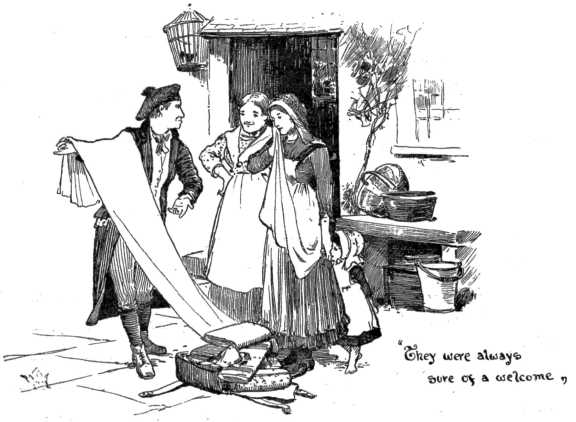
Among these good people there were both men and women, and poor Pig-Betty was one of the latter.
My mother and the other children used always to ask as one of their first questions when they arrived at Greystanes—that was the name of their uncle's country house—on their yearly visit, if Pig-Betty had been there lately, or if she was expected to come soon. One or other was pretty sure to be the case.
They had several reasons for their interest in the old woman. One was that they were very fond of blowing soap-bubbles, which they seldom got leave to do in town, and they always bought a new supply of white clay pipes the first time Pig-Betty appeared; another was that she had what children thought very wonderful treasures hidden among the coarse pots and dishes and jugs that she carried in a shapeless bundle on her bent old back. And sometimes, if she were in a very good humour, she would present one of the little people[36] with a green parrot rejoicing in a whistle in its tail, or with a goggle-eyed dog, reminding one of the creatures in Hans Andersen's tale of "The Three Soldiers." And the third reason was perhaps the strongest, though the strangest of all.
[37]
PART II.
The THIRD reason why the children were so interested in the old pedlar woman was, I said, the strongest, though the strangest of all. She was an idiot! They were almost too young to understand what being an idiot really meant, but they could see for themselves that she was quite unlike other people, and her strangeness gave her a queer charm and attraction for them—almost what is called "fascination." When she was at Greystanes, where she always stayed two or three days, they were never at a loss for amusement, for they did little else than run here and there to peep at her and tell over to each other the odd way she trotted about, nodding and shaking her head and talking on to herself as if she were holding long conversations. It did not do to let her see they were watching her, for it would have made her angry.[38] Indeed, several times the children had been warned not to do so, and their nurse had been told to keep them out of the old woman's way; but, as everybody knows, children are contradictory creatures, and in the country, nurse could not keep as close a look out on them as in town. Then it was well known that Pig-Betty was very gentle, even when she was angry—and she did have fits of temper sometimes—she had never been known to hurt anyone.
And, of course, she was not quite without sense. She was able to manage her little trade well enough and to see that she was paid correctly for the "pigs" she sold. She was able, too, to tell the difference[39] between Sunday and other days, for on Sunday she would never "travel," and would often, if she were near a village, creep into the "kirk" and sit in a corner quite quietly. Perhaps "idiot" is hardly the right word to use about her, for there were a few old folk who said they had been told that she had not always been quite so strange and "wanting," but that a great trouble or sorrow that had happened in her family had made her so. The truth was that no one knew her real story. She had wandered into our part of the country from a long way off, thirty or forty years ago, and as people had been kind to her, there she had stayed. No one knew how old she was. Uncle James, himself an elderly man, said she had not changed the least all the years he had known her.
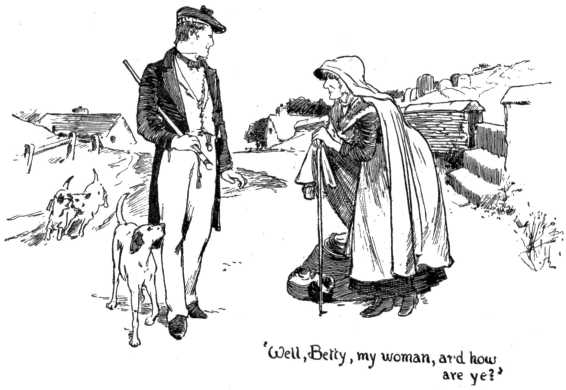
Uncle James was one of the people she had a great affection for. She would stand still whenever he passed her with a kindly, "Well, Betty, my woman, and how are ye?" bobbing a kind of queer curtsey till he was out of sight, and murmuring blessings on the "laird." He never forgot her when she was at Greystanes, always giving orders that the poor body should be made comfortable and have all she wanted.
One of his little kindnesses to her was the cause of a good deal of excitement to the children when they were with Uncle James. At that time gentlepeople dined much earlier than they do now, especially in the country. At Greystanes four o'clock was the regular dinner hour. The children used always to be nicely dressed and sent down "to dessert." And when Pig-Betty was there, Uncle James[40] never failed to pour out a glass of wine and say, "Now, who will take this to the old woman?"
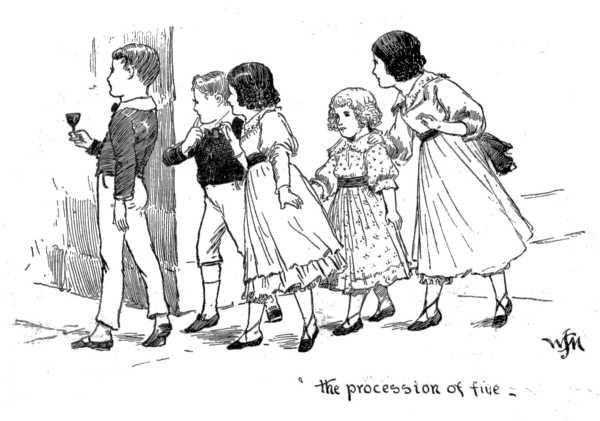
Pig-Betty knew it was coming, for she always managed to be in the kitchen at that time, and however busy the servants were, they never thought of turning her out. There was a good deal of superstitious awe felt about her, in spite of her gentleness; and the children would look at each other, half-wishing, half-fearing to be the cup-bearer.
"I will," Johnny would say; and as soon as he spoke all the others followed.
[41]
"No, let me," Hughie would cry, and then Maisie and Lily joined in with their "I will," or "Do let me, Uncle James."
"First come, first served," Uncle would reply, as he handed the well-filled glass to Johnny or Maisie, or whichever had been the first. Then the procession of five would set off, walking slowly, so as not to spill the wine, down the long stone passages leading to the kitchen and offices of the old house. And what usually happened was this.
As they got to the kitchen door, Johnny—supposing it was he who was carrying the wine—would go more and more slowly.
[42]
"I don't mind, after all, letting you give it, Maisie," or "Hughie," he would say.
"No, thank you, Johnny," they would meekly reply. And Lily, who was the most outspoken, would confess,
"I always think I'd like to give it her, but I do get so frightened when I see her close to me, that I really daren't," which was in truth the feeling of all four!
So it was pretty sure to end by number five coming to the front. Number five was little Annette, the youngest. She was a sweet, curly-haired maiden, too sunny and merry herself to know what fear meant.
"I'll dive it poor old Pig-Betty," she always cried, and so she did. Inside the kitchen the glass was handed to her, and she trotted up to the old woman in her corner with it, undismayed by the near sight of the queer wizened old face, like a red and yellow withered apple, and the bright piercing eyes, to be seen at the end, as it were, of a sort of overhanging archway of shawls and handkerchiefs and queer frilled headpiece under all, which Betty managed in some mysterious way to half bury herself in.
She always murmured blessings on the child as she drank the wine, and no doubt this little ceremony was the beginning of her devotion to the baby of the family.
This devotion was made still greater by what happened one day.
There were unkind and thoughtless people at Greystanes as well as[43] everywhere else. And one summer there came some "new folk" to live in one of the cottages inhabited by Uncle James's farm-labourers. This did not often happen, as he seldom changed his people. These strangers were from some distance, and had never happened to come across the poor half-witted old woman, and there were two or three rough boys in the family who were spoilt and wild, and who thought themselves far above the country people, as they had lived for some time in a small town. And so one day—Oh, dear! I am getting this chapter of mother's story too long. I must begin a new one.
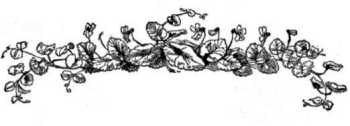
[44]
PART III.
Well, one day, as I was saying, the children, who had not seen old Betty for several weeks, were on their way to the village—two miles off—when near the corner of a lane, they heard a great noise. Loud voices and jeering laughter, and a kind of strange shrill shrieking, which made them stare at each other in wonder and almost fear. Nurse was not with them, they were to meet her further down the road, as she had gone on first with a message to a woman who was ill.
"What can it be?" said Maisie.
They hurried on to see, and the mystery was soon explained. There in the midst of a little group of boys, and two or three girls also, I am afraid, stood the poor old idiot. She was convulsed with rage, screaming, shrieking, almost foaming with fury, while first one then another darted forward and gave a pull to her skirts or jacket from behind, and as quickly as she turned, a fresh tormentor would catch at her from the other side, all shouting together at the top of their voices, "Wha is't this time, my Leddy Betty? Thaur, ye have him noo."
They were not hurting her, but it was the insult she felt so keenly, for she was used to respectful treatment. The Simpson boys, the new comers, were in the front of the fray, of course.
[45]
For a moment the five Greystanes children stood speechless with horror. Then Johnny darted to the idiot's side, he did it with the best intentions, but Betty, confused and blinded, did not distinguish him from the others, and dealt him a blow which sent him staggering back, as she howled out to him, "Ye ill-faured loon, tak' that."
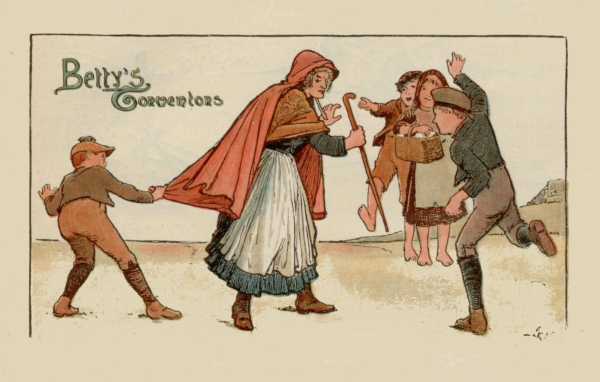
"Run, Johnny, run," shrieked Maisie, which Hughie and Lill, who were twins and always kept together, had already done, not out of cowardice but in search of help. But little Annette rushed forward.
"Bad boys that you are," she shouted with her little shrill baby voice that seemed to have suddenly grown commanding, "off with you.[46] You shall not torment my guid auld Betty." For though the children's mother was most careful that their speech should be "English," strong excitement would bring out their native tongue. And as the child uttered the last words she flung her arms round the poor woman, who, weak and feeble as soon as her fury began to lessen, tottered to the ground, where they clung together—the sorrow-crushed aged creature and the cherub-faced child—sobbing in each other's arms. For Pig-Betty had known her little friend in an instant.
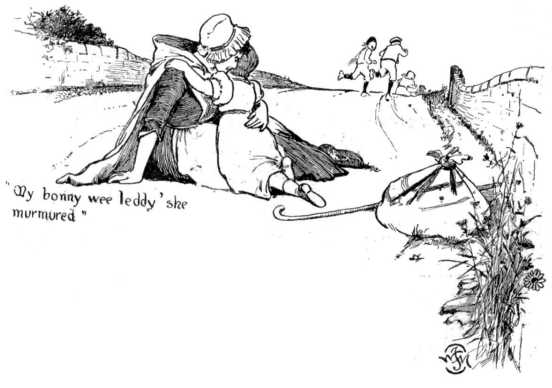
"My bonny wee leddy," she murmured, "auld Betty's ain wee leddy," and with her trembling fingers she untied the knotted corners of her bundle of "pigs," and searching for the best of her treasures, the best and biggest of her "whustling polls," she stuffed it into Annette's hands.
[47]
Strange to say the ruffianly group had already dispersed and were not again seen!
It was soon after that that the children went back again for the winter to their London home. Next year saw them once more in the north, and as nurse unpacked their trunks she came upon the green parrot, which Annette would never part from.
"I wonder if Pig-Betty's still alive," she said.
Oh yes—so far as was known at Greystanes, she was rambling about as usual, but she had not been there for some weeks. Fortunately for the children, however, it was near the time for her visit, as you shall hear.
A few days after their arrival they were all out together, when they happened to pass by a cottage, whose owner was famed for a very choice breed of dogs he kept.
"Let's peep over the wall into Sandy's yard, and see if he has any new puppies," said Johnny, and they all did so. No, there were no puppies to be seen, only an older dog which the boys remembered by the name of "Jock," and they called out to him.
But Jock took no heed. He was moving about the little enclosure in a queer, restless way, his head hanging down, his tail between his legs.
"Poor Jock," said Hughie, "how dull he looks! What a shame of Sandy to have gone out and left him alone!" For evidently there was no one at home in the cottage. Truth to tell, Sandy was off for the dog-doctor.
[48]
"Let's let him out," said Johnny, "and cheer him up a bit. He'll know us once he's out."
They did not hear a quick but shuffling step up the lane, nor a panting, quavering voice, "Bairns, bairns, dinna ye——"
It was Pig-Betty, just arrived that morning, and left by Sandy in charge of his cottage and the suspiciously suffering Jock—a charge she was quite able for.
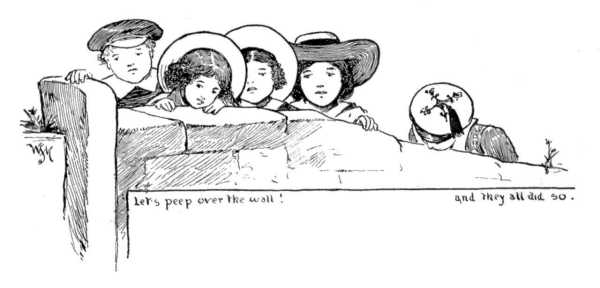
"Let no one gang near him," Sandy had said; "and, my woman, just ye sit at the gate there till I'm back. I'll no be lang."
But, alas, the children had come round by the fields behind the cottage.
It was too late—the yard gate was opened, and Jock, after sniffing and turning about came slowly out.
"Poor old Jockie," said Annette, always fearless, stooping to stroke him.
[49]
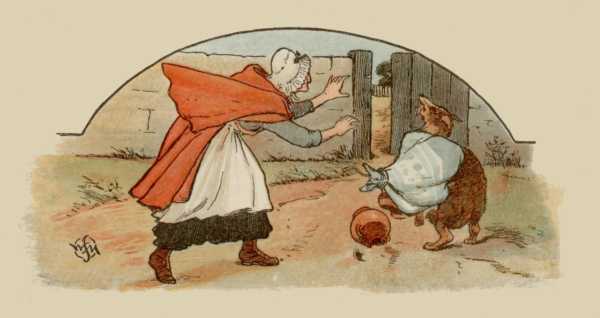
He turned upon her with a dreadful growl, he was not yet quite mad, but the poison was in him. And in another instant the deadly fangs would have been in the baby's tender flesh, but for the well-aimed blow which flung the dog back, though only for a moment. It was Betty, dashing at him with her bundle of "pigs," the only weapon at hand—the poor pigs smashing and crashing; but they only diverted Jock's attack. When Sandy and the dog-doctor came rushing up, she was on the ground, and Jock had already bitten her in two or three places. But all she said was, "My wee leddy, haud him aff my wee leddy."
And they were able to secure him, so that no one else was bitten.
No, Betty did not die of hydrophobia. She lived for a few months, not longer, her old nerves and feeble frame had got their death blow.[50] But she was tenderly cared for in a peaceful corner of the hospital at the neighbouring town. Uncle James and the children's parents took care that she should want for nothing, and as her bodily strength failed her mind seemed to clear. When little Annette was taken to say good-bye to the brave old woman, poor Pig-Betty was able to whisper a word or two of loving hope that she and her "wee leddy" might meet again—in the Better Land.
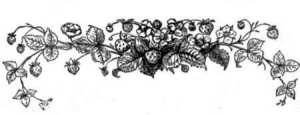
[51]
THE DORMOUSE'S MISTAKE.
They lived at the corner of the common. Papa, Mamma, Fuzz and Brown-ears, Snip and Peepy, their four children. It was a lovely place to live at, but as they had never seen any other part of the world, I am not sure that they thought it quite so delightful as they might otherwise have done. The children, that is to say—Papa and Mamma of course were wiser. They had heard of very different sorts of places where some poor dormice had to live; small cooped-up nests called cages, out of which they were never allowed to run about, or to enjoy the delightful summer sunshine, and go foraging for hazel nuts and haws, and other delicacies, for themselves. For an ancestor of theirs had once been taken prisoner and shut up in a cage, whence, wonderful to say, he had escaped and got back to the woods again, where he became a great personage among dormice, and was even occasionally requested to give lectures in public to the squirrels and water-rats, and moles and rabbits, and other forest-folk, describing the strange and marvellous things he had seen and heard during his captivity. He had learnt to understand human talk for one thing, and had taught it to his children; and his great-grandson, the Papa of Fuzz and Brown-ears, Snip and Peepy, had begun to give them lessons in this foreign language in their turn, for, as[52] he wisely remarked, there was no saying if it might not turn out useful some day.
The cold weather set in very early this year. Already, for some days, Fuzz and Brown-ears, Snip and Peepy had begun to feel a curious heaviness stealing over them now and then; they did not seem inclined to turn out in the morning, and were very glad when one evening their mother told them that the store cupboards being now quite full, they need none of them get up the next day at all unless they were inclined.
"For my part," she added, "I cannot keep awake any longer, nor can your Papa. We are going to roll ourselves up to-night. You young folk may keep awake a week or two longer perhaps, but if this frost continues, I doubt it. So good-night, my dears, for a month or two; the first mild day we shall all rouse up, never fear, and have a good meal before we snooze off again."
And sure enough next morning, when the young people turned out a good deal later than usual, Papa and Mamma were as fast asleep as the seven sleepers in the old story, which had given their name to the German branch of the dormouse family! Fuzz and Brown-ears, Snip and Peepy felt rather strange and lonely; two round furry balls seemed a very queer sort of exchange for their active, bright-eyed father and mother. But as there was plenty to eat they consoled themselves after a bit, and got through the next two or three weeks pretty comfortably, every day feeling more and more drowsy, till at last came a morning on[53] which six neat little brown balls instead of two lay in a row—the dormouse family had begun their winter repose. And all was quiet and silent in the cosy nest among the twigs of the low-growing bushes at the corner of the common.
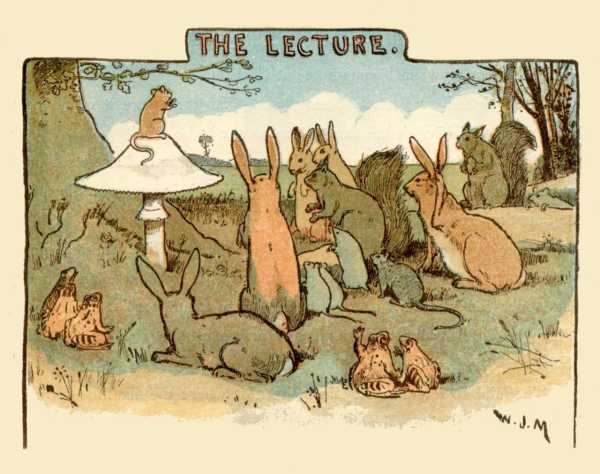
It seemed as if winter had really come. For three or four weeks there was but little sunshine even in the middle of the day, and in the mornings and evenings the air was piercingly cold.
"I suppose all the poor little wood-creatures have begun their winter[54] sleep," said Cicely Gray one afternoon as she was hastening home from the village by a short cut through the trees. "I must say I rather envy them."
"I don't," said her brother, "I shouldn't like to lose half my life. Hush, Cicely, there's a rabbit. What a jolly little fellow! How he scuds along! There's another, two, three! Oh, Cis, I do hope I shall get some shooting when I come home at Christmas."
Cicely sighed. "I hate shooting," she said. "I'm sure it would be better to sleep half one's life than to stay awake to be shot."
But it was too cold to linger talking. The brother and sister set off running, so that their cheeks were glowing and their eyes sparkling by the time they got to the Hall gates.
Three days later Harry had gone off to school. Cicely missed him very much; especially as a most pleasant and unexpected change had come over the weather. A real "St. Martin's summer" had set in. What delightful walks and rambles Harry and she could have had, thought Cicely, if only it had come a little sooner!
The mild air found its way into the nest where the six little brown balls lay side by side, till at first one, then another, then all six slowly unrolled themselves, stretched their little paws, unclosed their eyes, and began to look about them.
"Time for our first winter dinner," said Mrs. Dormouse sleepily; "it's all ready over there in the corner under the oak leaves. Help yourselves my dears, eat as much as you can; you'll sleep all the better[55] for it. And don't be long about it; it's as much as I can do to keep my eyes open."
Mr. Dormouse and the others followed her advice. For a few minutes nothing was heard but the little nibbling and cracking sounds which told that a raid had been made on the winter stores.
"Good-night again, my dears," said Papa, who was still sleepier than Mamma.
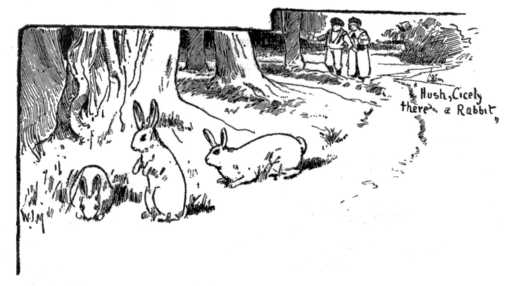
"Good-night" was repeated in various tones, but one little voice interrupted—it was that of Fuzz.
"I'm not sleepy, Papa and Mamma; I'm not a bit sleepy. I'm sure it's time to wake up, and that the summer's come back again. Brown-ears, Snip and Peepy, won't you come out with me? Papa and Mamma can sleep a little longer if they like."
"Nonsense," Mrs. Dormouse said sleepily.
And "Nonsense, brother," repeated the others, "don't disturb us."
[56]
But Fuzz was obstinate and sure he knew best.
He trotted off, looking back contemptuously at the five balls already rolled up again.
"Dear, dear! how silly they are to be sure," he said, when he found himself out on the grass. "Why, it's certainly summer again! The sunshine's so bright and warm, the birds are chirping so merrily. I feel quite brisk. I think I'll take a ramble over the common to the wood where our cousins the squirrels live, and hear what they have to say about it."
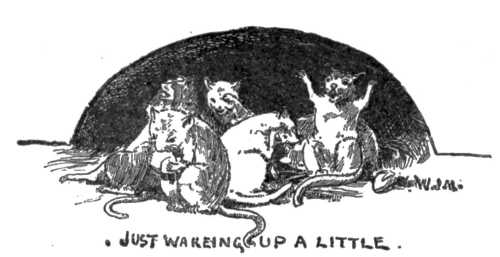
He cocked his ears and peeped about with his little sparkling eyes. Suddenly he caught sight of something white at the foot of one of the old trees. It was Cicely Gray in her summer flannel, which had been pulled out of the wardrobe again to do honour to St. Martin.
"Good morning, little dormouse," she said in her pretty soft voice, "what are you doing out of your nest in late November? Do you think summer's come back again already, my little man? If so, you've made[57] a great mistake. Take warning, and don't stray far from your home, or you may find yourself in a sad plight. This lovely weather can't last many days."
Fuzz looked at her.
"Thank you, miss," he replied, for, you see, he understood human talk, though it is to be doubted if Cicely understood him. "She must surely know," he reflected wisely, "and perhaps after all mamma was in the right."
[58]
So he scampered in to the nest again and rolled himself up beside the others.
That very evening the wind changed; the cold set in in earnest, and for three months it was really severe.
"I saw a little dormouse at the corner of the common yesterday," said Cicely the next morning. "I advised him to go home again; he had come out by mistake, thinking winter was over."
"You funny girl," said her mother. "I hope he understood you and followed your advice, poor little chap."
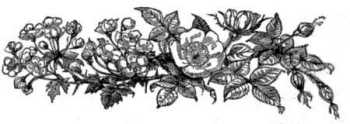
[59]
THE CHRISTMAS GUEST.
FROM A TRUE INCIDENT.
She was a very poor little girl, very poor indeed; often—indeed almost always—hungry, and thinly-clad, and delicate, but yet not altogether miserable. No, far from it, for she had a loving mother who did her poor best for her children. There were three or four of them and Emmy was the eldest. She was only six, but she was looked upon as almost grown-up, for father had died last year, and Emmy had to help mother with "the little ones," as she always called them.
They lived in a single room in one of the poorest and most crowded parts of great London; in a street which was filled with houses of one-room homes like their own. There was much misery and much wickedness, I fear, too, in their neighbourhood; drinking, and swearing, and fighting, as well as hunger, and cold, and sickness. But compared with several years ago, when Emmy's mother herself had been a girl living in much such a home as she now strove "to keep together" for her fatherless babies, compared with that time, as she, and others too, used often to say, "it was a deal better." There was less drinking and bad language; there was less misery. For friends—friends able and[60] earnestly anxious to help—had taken up their abode in the very next street to little Emmy's; the church had been "done up beautiful," and there there was always a welcome and a rest from the troubles and worries at home; and the clergyman, as well as the kind ladies who had come to live among their toiling, struggling brothers and sisters, knew all about everybody and everything, knew who was ill and who was out of work, knew who were "trying to be good" even among the children, knew even the tiniest tots by name , and had always a kind word and smile, however busy and hurried they were.
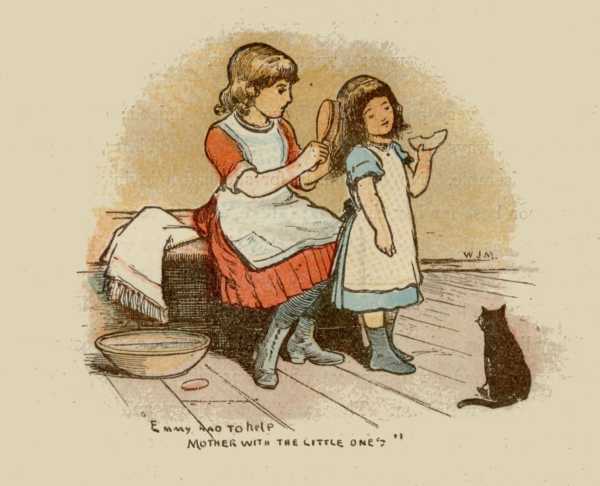
[61]
And, thanks greatly to these kind friends, Emmy's life was not without its pleasures. She loved the infant school on Sundays, she loved the "treats"; once last summer—and Emmy was old enough now to remember last summer well, though it seemed a very long time ago—there had been a treat into the country, a real day in the country, where, for the first time in her life, the child saw grass and trees.
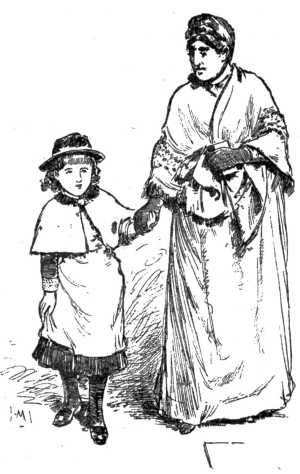
But it was far from summer time now, it was midwinter. Christmas was close at hand, and winter had brought more than its usual troubles to the little family. There were worse things this year than cold and scant food, chapped hands and chilblained feet. Tiny, as they called the baby but one, was very ill with bronchitis, the doctor could not say if she would get better, and sometimes it seemed to the poor mother as if it was hardly to be wished that she should.
"She suffers so, poor dear, and seeing to her hinders me sadly with[62] my work. I do feel as if I'd break down at last altogether," she said one evening—it was Christmas Eve—to a neighbour who had looked in to see how things were going on.
"And Emmy's looking pale," said the visitor, "she wants cheering up a bit too. Let her come to church with me for a change. I'm going to the evening service now."
Emmy brightened up at this. She had not been at church last Sunday, and, like most children, she was especially fond of going in the evening. It seemed grander and more solemn somehow, when all was dark outside. And the lights and warmth, and above all the music, were very pleasant to the little girl. So with a parting word of advice to the mother to keep up heart a bit longer—"things allus starts mending when they get to the worst"—the kind neighbour set off, holding Emmy by the hand.
It was beautiful in church, the Christmas "dressing up," as Emmy called it, had been completed that afternoon; to the child it seemed a sort of fairy-land, though of fairy-land she had never heard. But she had heard of heaven, which was better.
"It could scarce be finer there," she thought to herself dreamily, as she listened to the words of the service with a feeling that all was sweet and beautiful, though she could actually understand but little.
The sermon was short and simple. But Emmy was getting sleepy, and the thought of poor mother, and Tiny with her hacking cough, mingled with what she heard, till suddenly something caught her ear which startled her into attention. The preacher had been speaking of[63] the first Christmas-day, concluding with some words about the morrow, when again the whole Christian world would join in welcoming their Lord. For "again He will come to us; again Jesus Himself will be here in the midst of us, ready as ever to listen to our prayers, to comfort and console."
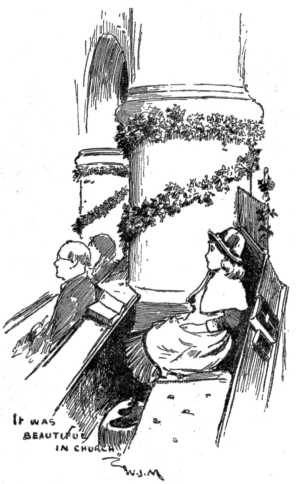
Emmy was wide awake now. She scarcely heard the words of the carol, she was in a fever of eager hopefulness.
"What a good thing I came to-night," she said to herself, "else I mightn't ever have knowed it. I would like to see Him first of all. There'll be such a many, and He'll have such a deal to do. But it wouldn't take Him that long to come round with me to see Tiny, and if He does, like in the story, He'll cure her in 'alf a minute. I know what I'll do"—and a little scheme formed itself in the childish mind—"though I'll not tell mother," thought Emmy, "just for fear like, I should be too late to catch Him."
[64]
"'Twas a lovely sermon, and so touchin' too," said Emmy's friend to another woman as they walked home.
"It strengthens one up a bit, it do," agreed her companion. "I'll try my best to be round for the seven o'clock service in the morning."
[65]
"Seven o'clock in the morning!" said Emmy to herself. "I'll best be here soon after six."
Christmas morning was very cold. There was some frozen snow lying hard and still white in the streets, and there was moonlight, pale and clear. So it was light enough for one of the Sisters, entering the church betimes, to distinguish a little figure curled up darkly in the porch. A thrill of fear ran through her for a moment. Supposing it were some poor child turned out by a drunken father, as sometimes happened, frozen to death this bitter night? But no—the small creature started to its feet.
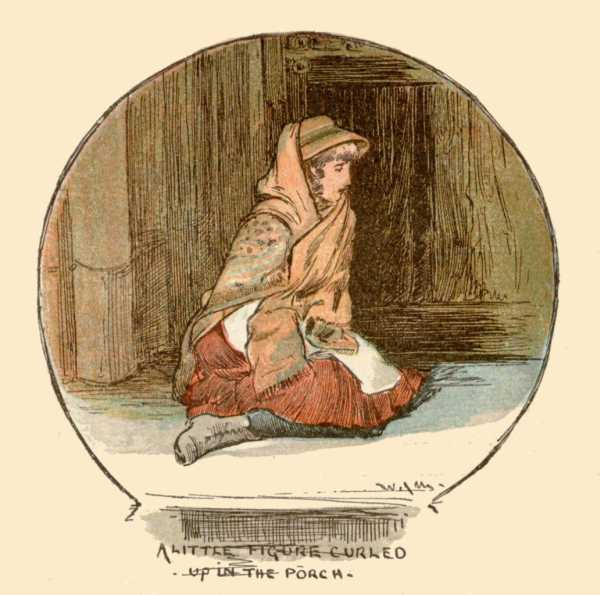
"Is it He? Has Jesus come?" she exclaimed. "Oh! do let me speak to Him first."
"My child!" exclaimed the sister, "what is it? Have you been dreaming? Why, it is little Emmy Day. Have you been here all night?"
"No, no," Emmy replied, her teeth chattering with cold, and the sob of a half-feared disappointment in her voice. "No, no; I slipped out while mother and all was still asleep. I'm waiting to ask Him to come to our Tiny;" and she went on to tell what she had heard last night, and what she had planned and hoped.
Her friend took her into her own room for a few minutes, and there gently and tenderly explained to Emmy her sweet mistake. And though her tears could not all at once be stopped, the little girl trotted back to her mother with comfort in her heart, and strange and wonderful, yet beautiful new thoughts in her mind.
[66]
"He is always near, I can always pray to Him," she whispered to herself.
And her prayers were answered. Tiny recovered, and thanks to the kind Sisters, that Christmas Day was the beginning of better things for the little family.
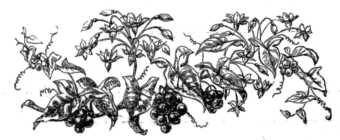
[67]
OLIVE'S TEA-PARTY.
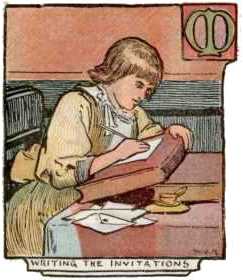
"Mamma," said Olive one day, "I want to have a tea party."
"Well, dear," mamma answered, "I dare say it could be managed. You must talk to Cara and Louie about it, and settle whom you would all like to ask."
"No, no," said Olive, "I don't mean that. I won't have my sisters, mamma. They like to ask big ones, and I want a party for my own self, and no big ones. I want to fix everything myself, and I won't have Cara and Louie telling us what to eat at tea, and what games to play at. You may tell aunty to 'avite them to her house that day, mamma, and let me have my own party; else I won't have it at all."
Olive was eight. She was the youngest of three. It oftens happens that the "youngest of three" fancies herself "put upon," especially when the two elders are very near of an age and together in everything. But this sudden stand for independence was new in Olive.[68] Mamma looked at her curiously. Had some foolish person been putting nonsense in her little girl's head?
"Cara and Louie are always kind to you about your little pleasures, Olive," she said. "I don't understand why you should all at once want to do without them."
Olive wriggled. "But I do," she said. "Lily Farquhar says her big sisters spoil her parties so, and they call her and her friends 'the babies,' and laugh at them."
"Are you going to invite Lily to your party?" asked mamma.
"Yes, of course. She's my best friend, and she knows lots of games."
"Very well. Then fix your day and invite your friends, and I will take care that your sisters don't interfere."
Olive looked very pleased. "I think next Wednesday would do," she said. "It's our half-holiday, and if Cara will help me on Tuesday evening I can get my lessons done, so that I needn't do any on Wednesday. It's howid to have to do lessons after a party," added Olive, with a languid air.
But mamma took her up more sharply than she expected. "Nay, nay, Olive," she said, "that won't do. If your sisters are to have none of the pleasure of your party, you can't expect them to take any trouble. You must manage your lessons as best you can."
Olive pouted, but did not dare to say anything. Truth to tell, her lessons at no time sat very heavily on her mind.
[69]
"It won't be my fault if I don't do them on Wednesday," she said to herself. "It'll be Cara's, and—and mamma's—so I don't care."
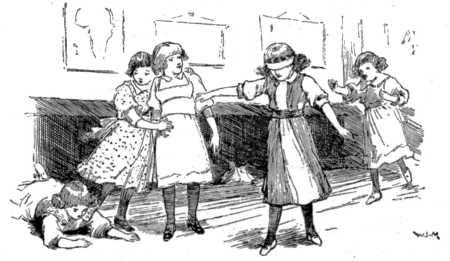
She found the writing the invitations more trouble than she had expected, and more than once did she wish she could have applied for help to Louie, whose handwriting was so clear and pretty, and who possessed such "ducky" little sheets of note-paper of all colours, with a teapot and "come early" in one corner. Olive's epistles were rather a sight to be seen; nearly all of them were blotted, and the spelling of some of her friends' names was peculiar, to say the least. Still they did their purpose, for in the course of the next day or two the little hostess received answers, all accepting her "kind invitation," except poor Amabel Pryce, who had so bad a sore-throat that there was no chance of her being able to go out by Wednesday. And in one note—from a little girl called Maggie Vernon—was something which did not suit Olive's present frame of mind at all.
[70]
"Harriot and I," wrote Maggie—Harriot was Maggie's sister—"will be so pleased to come. We love a party at your house, because your big sisters are always so kind."
Olive showed this to her adviser and confidante, Lily.
"Nonsense," said Lily, "she only puts that in because she thinks it looks polite. She's a goose, and so is Harriot; they make such a fuss about each other. They haven't the least bit of independence. Well, never mind. If they don't like your party, Olive, they needn't come again."
Olive felt consoled. But still—in her heart of hearts there was some misgiving. What should she do if they all wanted to play different games?—or if Bessy Grey tore her frock or spilt her tea and got one of her crying fits, as happened sometimes, and there was no one—no Cara or Louie to pet the nervous little girl into quiet and content again? What should she do, if——? But Lily did not leave her time to conjure up any more misfortunes.
"What are you in a brown study about, Olive?" she said. "You are so stupid sometimes."
To which Olive retorted sharply, and the friends ended their council of war by a quarrel, which did not raise Olive's spirits.
The great day came. Not very much had been said about it in the family circle, naturally, for when one member of the family chooses to "set up" for himself or herself, and keep all the rest "out of it," there cannot be as much pleasant talk as when everybody is joined together in[71] the interest and preparation. And Olive could not help a little sigh when, just before her guests came, she was called down to the dining-room to see the tea all set out. It did look so nice! Mamma had ordered just the cakes and buns Olive liked, and there were two or three pretty plants on the table, and everything was just perfect.
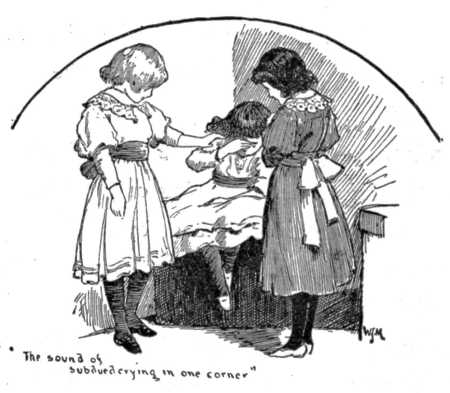
"I would have liked Cara and Louie to see it," thought Olive. "They needn't have gone out quite so early."
But the sound of the front-door bell ringing made her start. She ran off quickly to be ready in the school-room to receive her little friends. There were six of them. Lily Farquhar, of course, first and foremost; then Maggie and Harriot, Bessie Grey looking rather frightened and very shy, and two little cousins, Mary and Augusta Meadowes, who lived next door.
[72]
They all knew each other pretty well, so they were not very silent or stiff. Still as Olive could not speak to everybody at once, and was very anxious that no one should feel neglected, she was not sorry when the tea-bell rang. Lily was to pour out the chocolate, and Olive herself to make the tea. It passed off pretty well, except for Lily's spilling a good deal, and Olive's forgetting to put more water into the teapot, so that the tea became dreadfully dark and strong. But the cakes were approved of, and every one seemed content. Then came the great question of "What shall we play at?" Lily, who was clever at games, made herself a sort of leader, but she was not sensible enough to fill the post well. She was selfish and impatient, and being only a little girl herself, the others did not care "to be ordered about by her." Then Bessie Grey got knocked down at Blind Man's Buff, and of course she began to cry, and to say she wouldn't play any more if they were so rough. Maggie Vernon tried to soothe her, but Bessie pushed her away saying she didn't "understand," she wanted her mother, or next best, Cara or Louie, who were always "so kind." And the little Meadowes, being themselves but very small people, looked as if they were going to cry too; declaring that they would rather not play at all if they needed to run about so very fast. So Blind Man's Buff was given up and something quieter tried—Dumb Crambo, I think. But it was not very successful either, the little Meadowes needed so much "explaining," which no one was patient enough, or perhaps wise enough, to give clearly. And Lily insisted on being first always, and there was no one in authority to keep her "in her[73] place," where, when she really felt she must stay there, she could be a pleasant and bright little girl. So game after game came to a bad end, and as the children grew tired and their spirits went down, things grew worse and worse, till at last—no, I can best describe it by telling what mamma saw—when feeling rather anxious as to the results of Olive's fit of independence, she put her head in at the school-room door an hour or two after tea.
There was silence in the room except for the sound of subdued crying in one corner, which came, not from Bessie Grey—that would not have been surprising—but from the smallest Meadowes child, who had torn her frock and refused to listen to comfort from either her sister or Maggie. Harriot stood close by, and ran forward as the door opened.
"Oh, has our nurse come?" she said eagerly. "She's so kind, I'm sure she'd mend Gussie's frock, and then her nurse wouldn't scold."
"Our nurse isn't cross really," said Mary. "It's only that Gussie's silly. I think she's too little to come to a party."
Then catching sight of "mamma" the little girl grew red, and all the others looked frightened—such of them as saw mamma, that is to say. For Bessie Grey, after a long fit of sobbing, had fallen asleep on the floor, poor child, and—what do you think Olive and Lily were doing? Each with a story-book in her hand, they were comfortably reading at different corners of the room, heedless of the other children's dullness and tiredness.
[74]
"I want to go home," wailed Gussie. On which Bessie suddenly awoke, and began to cry again.
"Please, Gussie is rather tired," said the motherly little Mary. "Do you think we might go home without waiting for nurse, as it's so near?"
"And might we be getting our things on too?" said Maggie and Harriot.
Poor Mamma! She could scarcely speak, so ashamed did she feel.
"Olive!" she exclaimed. How Olive and Lily too did jump! "Is this the way you take care of your guests?"
"They were so stupid," murmured Olive. "And Lily would be leader, and she was so cross. I thought it was best to leave off playing."
[75]
"Come, my poor dear children," said mamma, turning to the five little girls. "Don't cry, Bessie dear, or you either, Gussie. We'll get your frock mended in a minute, and Cara and Louie will give you a nice game of musical chairs in the drawing-room to cheer you up before you go home. There is some fruit waiting for you too."
She marshalled them all off, smiles and chatter soon replacing the tears and yawns. Mamma stopped at the doorway.
"Miss Lily Farquhar," she said, quietly, "you had best remain here and enjoy your book till you are sent for."
To Olive she said not one word. But it was a very humble and penitent little girl who came that evening to tell her mother and sisters how sorry she was, and how foolish and selfish and ungrateful she now saw that she had been.
If Olive ever gives another tea-party I think the first guests she invites will be her kind big sisters, Cara and Louie.
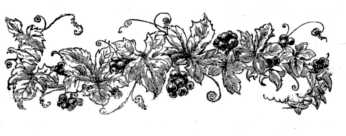
[76]
A LIVE DUMMY.
The Merediths were spending the autumn on the French coast, at a sea-bathing place called Sablons-sur-mer. It is a nice bright little place. I am afraid the inhabitants would be offended if they heard it called "little," for they think it a very important town! It consists of two long streets—one facing the sea, one inland, where the shops and the houses of the people who live there all the year round, are. And between these two streets run smaller ones—so small that they are more passage-ways than streets. The most imposing one is called an "arcade"; in it are the best shops, a bazaar of all sorts of fancy things to delight children's eyes, from tin buckets and spades to dig with in the sands, to rocking-horses, though not of a very expensive kind. At one corner of this arcade is a large, ready-made tailor's establishment; this shop, for reasons I will explain to you, divided the children's attention with the bazaar.
There were ever so many Merediths; three girls and two boys and a couple of cousins. The Sablons people are accustomed to English visitors, so the sight of this band of children was not startling to them; and the little messieurs, and the jeunes mees, soon had several friends in[77] the place, whom they never passed without a friendly nod and a bon jour or bon soir, as the case might be.
The cousins I have mentioned were not with the Merediths on their first arrival. There had been some doubt of finding a house large enough to take the whole party in, so Bessie and Hugh had waited at their own home in the country in England in a state of frantic anxiety, till one fine day came a letter from their aunt with the delightful news that the children might be despatched as soon as they could be got ready.
Bessie and Hugh had never paid a visit to France before; so the two new-comers had plenty of "guides" to explain everything to them, and show them the "lions" of Sablons-sur-mer. Only one condition was made by Lilian, the eldest and nearly "grown up" Meredith girl. Bessie and Hugh must manage not to seem like English tourists "gaping about with guide-books in their hands, and looking as if they had never been out of an English country village."
"But we scarcely ever have been," said Bessie; "at least, only when we go to grandmamma's at Cheltenham, and Hugh was once three days in London."
"That doesn't matter," said Miss Meredith; "you needn't look like some of the English people one sees over here. I feel quite ashamed sometimes to own them for my country people."
Bessie was too much in awe of her big cousin to ask her to explain more exactly what it was she was not to do, or to "look." But she[78] resolved to herself to be on her very best behaviour, and Madge and Letty assured her it would be "all right"—she needn't talk French when there was any one who "mattered" to hear, and she needn't seem as if things were strange to her, that was what Lilian minded.
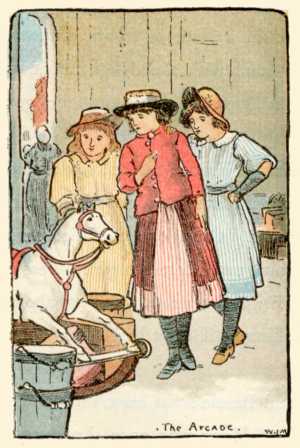
"Mayn't I look in at the shop-windows, even?" asked Bessie, rather dolefully.
Shop-windows were very delightful and charming to the little country cousin.
"Of course you may. Every body does," said Letty; "especially at the bazaar. It's not windows; it's all open, you know, like stalls at a market," explained Madge; "it's a regular bazaar. Not look at it!—why it's made to be looked at. And oh; Bessie," Letty went on again, "you will be amused at the big tailor's, or ready-made clothier's, as mamma calls it, at the corner of the arcade. It's something like Madame Tussaud's—such a lot of wax dummies at the door. And they change their clothes every few days. Some of them are quite big, like men; and some little boys. They've got one now which they think is dressed like an English sailor-suit boy—you never saw such a costume![79] And there's a man in a red coat—our boys say he is meant to be an English 'milord' dressed for 'the hunt.'"
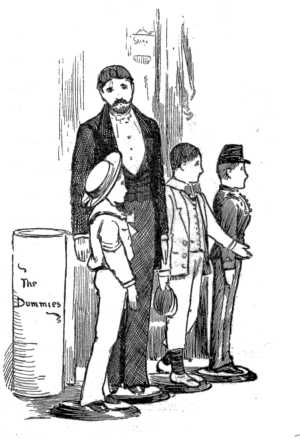
When Bessie saw the bazaar she was as full of admiration of it as even Madge and Letty could desire, especially of the big tailor's. There was a brilliant show of figures, from the little wax boy in imaginary English sailor costume, to a moustached gentleman elaborately got up in evening suit, white tie and all.
"Oh, how funny they are!" Bessie exclaimed. "But I don't see the one in the red coat."
"He's not there to-day," said Madge. "Perhaps we'll see him again to-morrow, in something different."
"It must be great fun dressing, and undressing them," said Bessie. "Do they change them nearly every day?"
"Oh no, not so often as that. But we watch them always, to see."
But for the next two or three days there was no change. Bessie looked in vain for the red-coated one she was so curious to see.
[80]
Now I must tell you that there was sometimes a regiment, or part of a regiment, at Sablons. They came for rifle-practice on the sands; and there was always a great excitement when a new detachment came in. And a few days after Bessie and Hugh made their appearance, the town was awakened early one morning by the tramp of a number of red-coats, who had marched over from an inland town, where there were large barracks. Next day on their way home, as usual, from their morning bath, the little girls passed through the arcade. Madge and Letty did not give the dummies more than a passing glance, till suddenly they noticed that Bessie had stayed behind.
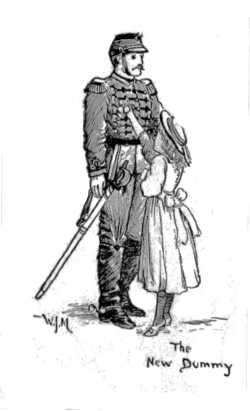
"There she is," said Letty; "she's staring at the figures. Why—is that—?" and she hesitated.
There she was, sure enough—Bessie, that is to say—standing in front of a tall figure, a red-coated one in all the glory of a scarlet uniform, and with several medals on the right breast, which the little girl on her tip-toes was reaching up to and examining, one after another, with great interest. Letty and Madge drew near and looked at her with a curious misgiving. She glanced round.
"Letty, Madge," she said, "do come here and look at this new dummy. It's got a lot of medals, and——"
[81]
She stopped with a little shriek. The "new dummy" had suddenly raised its right arm, saluting Bessie with military precision as it stepped slightly to one side, with the words—
"A votre service, Mademoiselle."
"Oh, oh!" gasped Bessie. "It's alive—it's—it's a man, a living soldier."
And so the supposed dummy was! A young officer, who, happening like the children themselves to be standing in front of the tailor's staring at the figures, had actually been mistaken by Bessie for one of the waxen group. He had entered into the joke, and remained perfectly motionless while the little girl made her investigation, doubtless explaining all to himself by the fact of her being a jeune mees—one of that extraordinary English nation of whom it is impossible to say what they won't do next.
Oh, how ashamed Bessie was! How scarlet grew Letty and Madge! But there was nothing to be done. The officer had already disappeared at the other end of the arcade with a second friendly and smiling though respectful salute.
One thought struck the three children—Susanne, the maid, was fortunately a little in advance and had not seen the strange mistake.
"Don't let's tell Lilian," they said. "She'd never get over it, she really wouldn't."
But mother—aunty as she was to Bessie—was told, and comforted the mortified and shamefaced little girl as well as she could.
[82]
"After all," she said, "it was nothing naughty; Bessie had not meant to be rude; and she was quite sure the officer had not thought her so."
Nor had he. But it was a very amusing story to relate; and if Bessie had been within hearing of him when he told it to his brother-officers, I think she could not but have joined in their laughter.
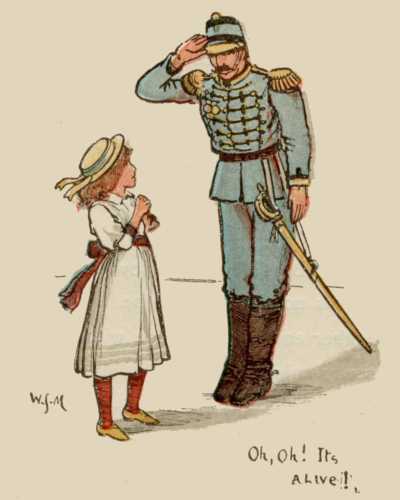
[83]
A Queer Hiding-Place
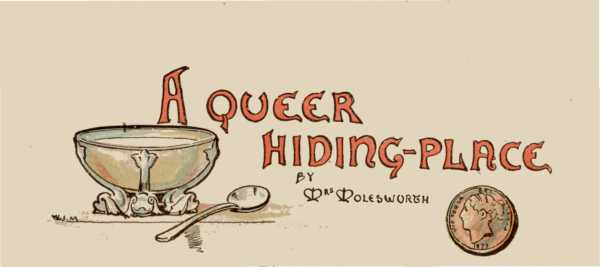
"Don't forget to give Theresa the pound from mamma," said Mabel, as she kissed her cousin Eleanor one afternoon when saying good-bye. "I must be quick; it's getting quite dark, and I was to be home early. Come along, Fred."
"You're sure you've got the pound, are you, Nelly?" asked Fred mischievously. "Mamma told Mabel about it ever so many times. She's so famous at remembering things herself, I like hearing her tell you not to forget."
Eleanor put her hand into her pocket.
"I think I've got it," she said; "I remember it was wrapped in a piece of blue paper, wasn't it? You gave it me just before we sat down to play our duet, and I was to say it was for aunt's subscription to—to—oh dear, I've forgotten," and she stood there in the hall, where she had come down to see the last of her visitors, looking the picture of perplexity.
[84]
"Oh, you silly girl!" said Mabel, impatiently. "It is mamma's subscription to Theresa's Christmas dinners' card. There now, don't you remember? You are so dreadfully absent, Eleanor!"
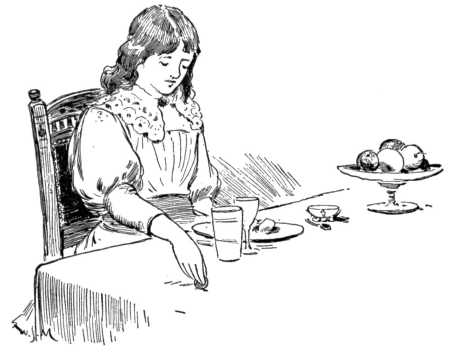
"I remember now—oh yes, of course. I won't forget again," said the girl; "little" girl one could scarcely call her, for though she was only thirteen she was as tall as her elder sister of eighteen. "Good-night again, Mabel. I must be quick, for I have to write to Charley before dinner. You know I dine late just now during the holidays," she added proudly.
"But the pound—the pound itself—have you got it?" repeated Fred.
Again went Eleanor's hand to her pocket.
[85]
"Oh dear, I forgot I was feeling for the pound," she exclaimed. "Yes, here it is! I'll give it to Theresa quite rightly, you'll see."
Eleanor hurried away to write her letter to Charley, for to-morrow would be Indian mail-day, and she had put it off too late the week before.
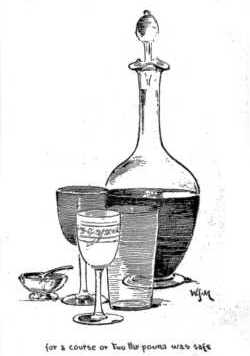
"Now I must give the pound to Theresa at once," she said, again depositing it in her pocket when she changed her dress for dinner. Something or other put it out of her head in the drawing-room—poor Eleanor's head was not a very secure place to keep anything in for long! It was not till she and her mother and Theresa and her seventeen-years' old brother Mark were at table, and half way through dinner, that the unlucky coin again returned into her memory. No thanks to her memory that it did so! It was only when she pulled out her handkerchief that the little paper packet came out with it and fell onto the floor.
"Oh," said Eleanor, as she stooped to pick it up, "what a good thing I've remembered it! Here, Theresa, here's a pound for you from aunty, for your—for the—oh, what is it? Your subscription for Christmas cards—no, I mean your subscription-card for Christmas dinners—yes, that's what it's for."
[86]
"All right," said Theresa, quietly, "I understand. But I wish you had given it me up-stairs, Nelly, I haven't got a pocket in this thin skirt. Never mind," and she unwrapped it as she spoke, and placed it on the table beside her.
"There now," she said, "I can't forget it. It is too conspicuous on the white cloth."
The sisters were sitting next each other; that is to say, Theresa was at one end with Mark opposite, and their mother and Eleanor were at the sides. The table was small, though large enough for a party of four.
Not long was the gold coin allowed to rest peacefully where Theresa had placed it. Eleanor's fingers soon picked it up. First she examined it curiously by the light of the candle beside her, then when she had satisfied herself as to its date and some other particulars, she took to "spinning" it on the table. This was not very successful; to spin a coin well requires a hard surface for it to twirl on. Eleanor tried once or twice, then ended by "spinning" the sovereign on to the floor. Down she ducked to pick it up again, thereby attracting her mother's notice.
"Nelly, my dear, what are you stooping down so awkwardly for?" she said.
"Oh," said Theresa, "it is all that pound. Do leave it alone, child, or it will be getting lost altogether," and she took it out of her sister's hand and put it under her wine-glass. "There," she said, "don't touch it again."
And for a course or two the pound was safe. But Theresa forgot[87] that wine-glasses are not a fixture; after a while the table was cleared of them and the crumbs brushed away for dessert. The shining sovereign was again exposed to full view. Mother, Theresa, and Mark were talking busily about something interesting, Eleanor's ears were half-listening, but her restless fingers were unoccupied. They seized on the coin again, and a new series of experiments with it was the result, even though she herself was but vaguely conscious what she was about. At last just as she had found a new trick which amused the babyish side of her brain greatly, came a remark which thoroughly caught her attention.
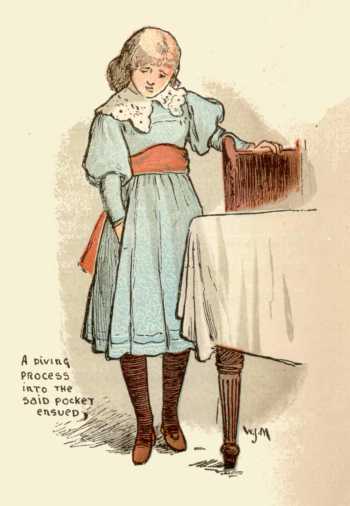
"The day after to-morrow, Nelly, don't forget," said Theresa, "I'm going to have the Leonards at afternoon tea."
And the talk ran upon the Leonards, till they rose to go upstairs to the drawing-room. Then came the exclamation from Theresa. "My pound, Nelly, have you touched it? I put it under my wine-glass, but of[88] course I forgot—the wine-glasses were changed. Henry," to the footman, "didn't you see it when you moved the glasses? It was there."
Henry grew red and stared.
"Yes, ma'am, it was there. I saw it. I left it on the cloth."
Eleanor stared too, though she did not grow red.
"Yes," she said, "it was there. I took it up again, but I'm sure I did nothing with it."
Nevertheless a diving process into her pocket ensued—in vain; then she got up and shook herself; then everybody began creeping and crawling about on the floor—in vain; then Mark got down a candle under the table, thereby, as it was in a high silver candle-stick, nearly setting everything on fire; then—then—I need not describe the well-known and most disagreeable experience of hunting for a lost object, which of course
We seek in every corner but the right."
On the whole poor Henry had the worst of it. He was told to examine "my tray," and to overhaul "my pantry," from top to bottom, which he did with no result. I think he would gladly have gone down the drain-pipe leading from "my sink," if he could have got into it.
"It is an uncomfortable affair," said Nelly's mother gravely. "You see the young man has so newly come."
"But, mother, I am sure I saw it after the dessert was on the table, and the servants out of the room," said Eleanor eagerly.
[89]
"Then, my dear, where is it?"
You can fancy what an unsettled, spoilt evening it was. The ladies went upstairs at last, but Mark would not give in. He stayed in the dining-room by himself, searching like a detective. Suddenly there came a shout of triumph.
"I have found it," he called upstairs; "it is all right, Nelly."
So it was—and where do you think it was?
I will help you to guess by telling you one circumstance. There had been nuts at dessert.
Well, what of that?
The salt-cellars had been left on the table. And buried in one of them, shining yellow and bright in the white powder, lay the coin! Was it not clever of Mark to have thought of it?
"Oh yes," said Eleanor, looking uncommonly ashamed of herself, "I remember—I pressed it down on to the salt, and then I covered it up. It looked so comfortable. Oh I am so sorry!"
See what comes of letting your fingers get into the way of "tricks," and letting your wits go wool-gathering.
But poor Henry's character was saved.

[90]
Blue Frocks and Pink Frocks
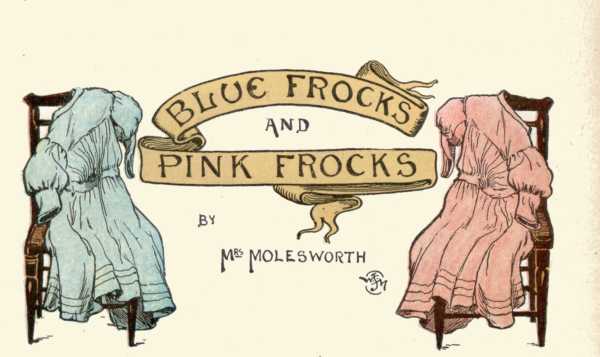
Rosalind and Pauline Wyvill were not twins, though at first sight nearly every one thought they were. Rosy was eleven and Paula only nine-and-a-half, but Paula was very tall for her age, and Rosy, if anything, small for eleven, so they were almost exactly the same height. And though Paula was much fairer than her sister, who had brown hair and rather dark grey eyes, still there was a good deal of likeness between them, and they were generally dressed exactly the same, which made them seem still more like twins.
Their mother was particular about their dressing the same, but now and then it was a little difficult to manage, for somehow Paula's frocks and hats and jackets generally got shabby long before Rosy's, and if an[91] accident—such as tearing or burning or staining—was to happen, it was perfectly sure to come to Paula's clothes, and not to her sister's. In such cases, however, the misfortune had often to be endured, for their mother could not of course afford to get new things every time Paula's came to grief, though now and then she had to get an extra frock or jacket of some stronger or stouter material for the little girl to wear, if those the same as her sister's had been spoilt past repair.
It came to pass, one Christmas holiday, that the two children were invited to spend a week with an aunt by themselves. It was the first visit they had ever paid on their own account, and they were both pleased and excited about it.
This aunt was their father's elder sister. She was very kind, but not very much accustomed to young people, and in some of her ideas she was perhaps extra particular and what people now-a-days call rather "old-fashioned."
"You must show your aunt that I have taught you to be very neat and tidy," said their mother, a few days before the little girls were to go, "for she is rather strict about such things; it may be a little difficult for you, as you will have no maid of your own with you. Whatever you do, be sure always to be dressed exactly alike, that is one of the things that your aunt will notice the most."
"Which of us must fix what we are to wear?" said Paula; "mayn't we take it in turns?"
"I don't think there should be any difficulty about it," said their[92] mother. "I should think it would be the nicest to consult together, without any fixed rule."
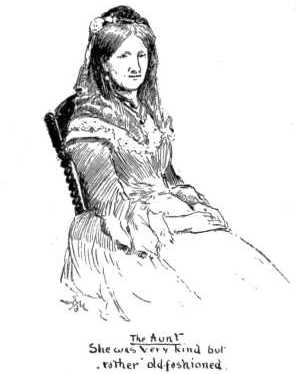
"Oh, I daresay it will be all right," said Rosy, thinking to herself that, as she was older than her sister, it would be only fair for her generally to have the first choice. "Do you think we shall have the same room, mamma?"
"No," their mother replied. "I was forgetting to tell you that you are to have two small separate rooms, as there will be other people staying in the house, and the larger rooms will be needed for them, so I have told Ann to pack up your things in two small boxes instead of together, but remember you have everything exactly alike, so that there will be no excuse for your not always being dressed the same. And, Paula, I do hope you will manage not to spoil anything during these few days."
"No, mamma, I'll try not," Paula replied, but she spoke rather absently, for she was not really attending to her mother's last words.
"What a lot of settling it will take, every time we dress," she was[93] thinking to herself. "I hope we shan't quarrel about it." For it must be owned that though Rosy was a very kind elder sister, she was sometimes rather masterful, and that, though Paula would give in readily enough when spoken to gently, she could sometimes be very obstinate, if not taken exactly in the right way.
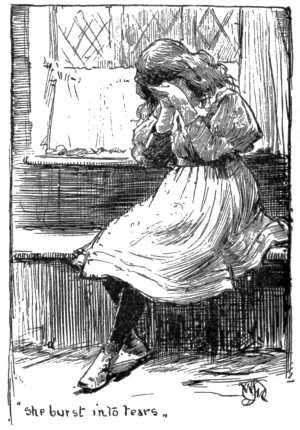
This is not a story, as you might expect, of Paula's misfortunes in the way of accidents to her clothes during their week's visit. More by luck than good management, probably, no very important disaster of the kind occured, and the first two or three days at their aunt's passed prosperously. Paula gave in to Rosy's wishes as to what frocks they were to wear, and indeed during the daytime there was not much chance of difference of opinion, as, being winter, they had only two each, Sunday and every-day ones. But their kind mother had given them some new and pretty evening dresses, prettier than they had ever had before, and the little girls were very much pleased with them. Unluckily, however, they had a disagreement of taste about them, Rosy preferring the pink ones and Paula the blue.
On the third evening of their visit, an hour or so before it was time[94] to dress, they began talking about what they should put on, for coming into the drawing-room before dinner.
"It is the turn for our pink frocks to-night," said Rosy, in the very decided way that always rather roused Paula's spirit of contradiction. "And I'm very glad of it, for I like them ever so much the best."
"I don't," replied Paula, rather crossly, "I think the blues twenty times prettier, and we never fixed that we were to wear them in turns."
"Perhaps the blue suits you best," said Rosy, "but the pink suits me; I heard somebody say so the night we came, and to-night is rather particular, for you know it's uncle's birthday, and we are to go in to dessert and sit up an hour later. It is only fair that I should have what I like best, as I'm the eldest, besides it's the turn of the pinks."
"Nonsense about turns," said Paula, more crossly than before, "why shouldn't I look nice too, on uncle's birthday? I'll wear the blue."
"And I'll wear the pink," said Rosy, with the most determined air.
"You'll be punished for it if you do," said Paula, "just think how vexed aunt will be if we're different, particularly to-night, when it is going to be a regular dinner-party."
"I shan't be punished worse than you," was Rosy's reply, "and I shan't deserve it, and you will."
It was not often the little sisters' quarrels went so far as this. Paula felt herself getting so angry that she was afraid what she mightn't be tempted to say next.
She ran out of the room, banging the door behind her I am afraid,[95] and rushed upstairs, where she burst into tears; for anger makes children cry quite as often as sorrow. But before she had been many minutes in her own room, her tears grew gentler, for she was a kind-hearted and loving little girl, and when she had bathed her face, to take away the redness from her eyes, she ran downstairs again to look for Rosy and make friends. But Rosy was not to be found anywhere—her aunt had called her into the conservatory to help her with some flowers she was arranging there, and after searching for her sister everywhere she could think of, Paula had to go upstairs to dress, as the first gong sounded.
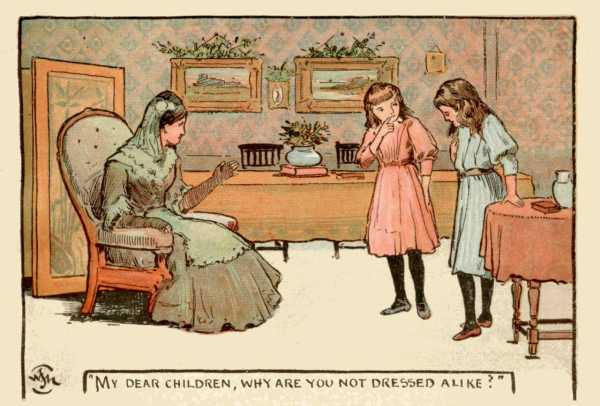
"As soon as I have done my hair, I'll run to Rosy's room," she thought to herself, but then another idea struck her, she would give Rosy[96] a pleasant surprise. "I'll put on the pink frock without telling her," she thought, "she will be pleased when she sees me with it on." And she made haste with her dressing so that Rosy might find her already in the drawing-room when she came down.
Thus it was that when Rosy, who was a little late of being ready, looked into Paula's room on her way downstairs, she found her sister gone. And what do you think happened? there was Paula smiling and pleased in the pink frock, as Rosy, also smiling and pleased with herself, walked in in the blue!
But Aunt Margaret, when she caught sight of them, looked neither smiling nor pleased.
"My dear children," she said, in a tone of vexation, "why are you not dressed alike? On your uncle's birthday too."
The little girls' faces fell.
"Oh, auntie," said Rosy, "it's all my fault, but I meant to please Paula, by putting on the blue."
"And I meant to please Rosy," said Paula, "by wearing the pink."
And then the whole story was explained to their aunt, who could not help smiling at the odd result of their wish to make up their quarrel.
"Change your frocks," she said, "while we're at dinner, so that you may be the same at dessert, that will put it all right."
She made rather a mistake, for of course only one frock needed to be changed; which it was I cannot tell you. I only know that they came into dessert and took their place one on each side of their uncle, dressed alike—in blue or pink!
Transcriber's Notes:
Inconsistent and archaic spelling and punctuation retained.
P. 60: "tiniest trots by name" changed to "tiniest tots by name".
